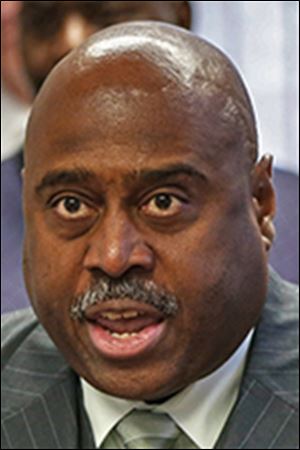
EDITORIAL
Copping out
12/23/2013
Diggs
The departure of Toledo Police Chief Derrick Diggs was all but inevitable after Mayor-elect D. Michael Collins defeated incumbent Mike Bell last month. After the election, Mr. Collins asked Mr. Diggs to resign.
The mayor-elect said Friday, in an interview with The Blade’s editorial page, that he was stung that Chief Diggs, who worked with Mr. Collins as a police officer, failed to defend him against campaign allegations of racism. Last week, Mr. Collins said he would promote Toledo Police Lt. William Moton to chief, after Mr. Diggs announced he would retire, citing “irreconcilable differences” in philosophy with the new mayor.
Despite these differences, Mr. Collins should respect Mr. Diggs’ record of reducing crime, acknowledging the major progress the chief achieved in making Toledo safer through technology and data-driven and community policing.
Mr. Collins says he plans to hire 40 police officers a year over the next four years, which should, with retirements, provide a net increase of at least 10 officers a year. He also wants to focus on community policing, with officers who know the neighborhoods they patrol and the people who live there. No police chief in the country would argue with that.
But many of Chief Diggs’ initiatives are also worth maintaining. After taking office in late 2011, Chief Diggs improved community relations and boosted the morale of his 500-plus officers, despite historically low numbers of officers and demoralizing pay cuts.
He stressed community policing and crime-prevention programs, including options for juvenile offenders and prison visits to Ryan Correctional Facility in Detroit for at-risk youths. He planned to expand the department’s domestic violence unit. These are initiatives the new administration should continue.
Chief Diggs also put renewed emphasis on social media. He turned the department’s Facebook page into one of the nation’s most active police pages.
Under Mr. Diggs, the department used data to target resources on crime “hot spots.” He met with high-ranking officers every two weeks to analyze crime data. Commanders were held accountable for crime spikes in their areas.
Those efforts helped drive double-digit percentage decreases in violent and property crimes in Toledo during the first half of this year, according to FBI statistics. Homicides are down 45 percent; rapes, 11 percent; assaults, 23 percent, and burglaries and auto thefts have dropped more than 20 percent.
Mr. Diggs fell short — way short — on communications and transparency, regarding news media as irritants and engaging in an illegal, silly, and ultimately futile fight to prevent The Blade from obtaining the department’s gang map.
Mr. Collins expects Mr. Moton to be a far more open police chief. In recent media interviews, Mr. Moton has appeared candid and straightforward, but the real test will come when problems prompt reporters to ask hard questions about policies and procedures. Reporters, like police officers, have jobs to do.
It’s encouraging that Mr. Moton wants to build on the data- and intelligence-led policing that Chief Diggs brought to the department. An experienced street cop, he seems to understand the deep-seated mistrust, even animosity, that some community members feel toward cops. No police department can be effective without the support of residents.
Mr. Moton, 68, will serve about one year as chief before he retires under the terms of an incentive program. He said he would use that time to identify a successor. That assumes Mr. Moton’s successor will come from within the Toledo Police Department — and it ought to be far too early to assume that.
Mr. Collins told The Blade’s editorial page that he’s not ruling out hiring a successor to Mr. Moton from outside the department, but he expects another leader to emerge from the ranks of the city force. The new administration appears reluctant to consider executive candidates from outside of Toledo.
That’s a mistake. Hiring a police chief from within the department has advantages and disadvantages, but the mayor cannot afford to limit the field of candidates for important jobs.
Toledoans deserve a national search for a permanent chief, whether he or she comes from within the department or outside. Meanwhile, Mr. Collins would best serve the people of Toledo by maintaining police policies and programs that have worked well under Chief Diggs.